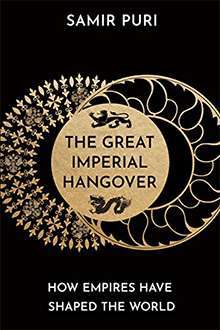 This is a remarkable book, the clearest history of the world I have ever encountered.
This is a remarkable book, the clearest history of the world I have ever encountered.
By exploring how empires rose and fell throughout history, Puri provides both an overview of world history and some basis for understanding international relations today. He does this be dividing this book into seven sections covering America, Britain, Europe, Russia, China, India, the Middle East and Africa.
While distinct they are also interwoven and inter-related between ancient and modern.
In each case the author looks at the development of empires – conglomerations of nations and countries ruled by a single imperial entity – and their influence on the ruling entity’s development and position in the world.
Not only is this massive in scope, it is entirely non-partisan. Puri doesn’t look at the world from a Euro-centric or any other-centric point of view. His perspective is that of the non-aligned observer and analyst. This make his work refreshing and very easy to digest – he’s neither pro- nor anti- anyone.
It’s also very immediate. Published in 2020, Puri draws lines from the most ancient civilisations to what’s happening in Ukraine and the South China Sea today. His analysis does not excuse brutality but seeks to put it into context.
Each area covered has its own imperial idiosyncrasies that help to explain, or at least put into perspective, its behaviour in our post-imperial world. I found I gained a real understanding of how each region covered behaves these days from its imperial past, directly or by influence.
While none of this is simplistic – in fact Puri’s analysis is both deep and acute – it’s written in such an accessible style that it’s not at all hard to read. In terms of whether this is reliable history, it’s significant that Puri’s text takes up 300 pages, followed by a 22 page bibliography, 33 pages of notes and references, and a 19 page index. This is not top-of-the-head stuff.
Samir Puri is well placed to make the observations he does, with a family background covering Africa, Asia and Europe (which he refers to in the book) and having worked for the British Foreign Office and the US global policy think tank RAND, before becoming Adjunct Professor at the Johns Hopkins School of Advanced International Studies and Visiting Lecturer at the King’s College London department of War Studies. He can personalise many of the places he writes about because he’s been there.
Oh, and he’s 42 years old. I suspect Puri’s relative youth contributes directly to his ability to put imperial history into modern perspective. His is not an academic understanding of history so much as a social one. And very much with a view to the future.
If I have single question mark over this book, it’s the absence of coverage of Japan and South America. In both regions, imperial history has obviously played a huge part, yet they don’t get any real coverage. I can only hope Puri gives them the same treatment in future works.
In the meantime, The Great Imperial Hangover is an engaging, deeply thoughtful and thought-provoking analysis of the history of empires and how they shaped the world we live in today.
Highly recommended.